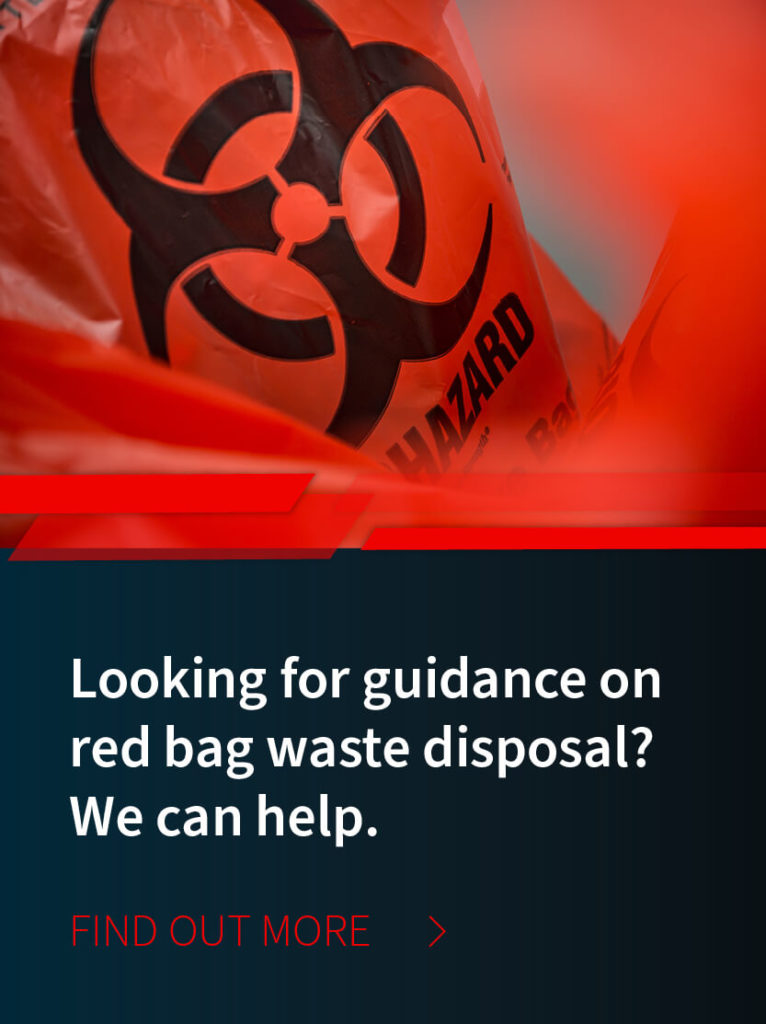
/ IN THIS BLOG
Biohazardous waste might not be the first thing you think about if you work in an urgent care center in Georgia. However, proper biohazardous waste management is a critical component to urgent care center compliance. Not only does compliance ensure you avoid hefty fines, but it also protects staff, patients, and the environment from exposure to potentially infectious materials. And as a side bonus, proper waste disposal can reduce the costs of waste disposal by preventing general waste from entering biohazard waste streams which are decidedly more expensive to dispose of.
The good news is you don’t need to be a waste management expert to follow proper biohazardous waste protocols. Learn practical steps tailored to the fluctuating patient volumes and limited storage challenges urgent care facilities often face. Here you’ll find easy-to-follow do’s and don’ts to manage biohazard bag waste (commonly referred to as “red bag waste”) effectively while staying compliant with Georgia regulations.
01 / Understand What Belongs in the Red Bag
Do: Use red bags exclusively for regulated medical waste. This includes items contaminated with blood, bodily fluids, or other potentially infectious materials (OPIM). Common examples include gloves, gauze, and disposable gowns that have been visibly soiled.
Don’t: Toss general waste, such as food scraps, paper products, or recyclable materials, into red bags. Similarly, pathological waste, trace chemotherapy materials, and expired medications should not be disposed of in red bags. Mixing non-regulated waste can drive up disposal costs and create compliance risks.
Proper segregation of waste ensures compliance with Georgia law and helps your facility save money by reducing the volume of waste treated as bio-hazardous.
02 / Handle Sharps with Care
Do: Always dispose of needles, syringes, and other sharps in puncture-resistant sharps containers. These containers should be leak-proof, labeled, and located in easy-to-access areas where sharps are used.
Don’t: Place sharps in red bags. Doing so increases the risk of injury to staff and waste handlers. It also violates Georgia state regulations. Improper disposal of sharps is a leading cause of workplace accidents in healthcare settings, so following this guideline is crucial to creating a safe environment.
03 / Train Your Staff Regularly
Urgent care centers often experience high turnover or use temporary staff during busy periods, making regular training essential.
Do: Provide comprehensive training on what qualifies as red bag waste, how to segregate it, and the proper handling of sharps. Use visual aids, hands-on demonstrations, and ongoing refreshers to ensure all team members understand the rules.
Don’t: Assume new hires or temporary staff know the protocols. Even experienced healthcare workers may not be familiar with Georgia-specific regulations or your facility’s internal processes.
By investing in education, you reduce the likelihood of mistakes and foster a culture of compliance.
04 / Optimize Waste Storage
Your urgent care facility might be challenged with limited storage space. If that’s the case, it’s helpful to make proper waste containment a priority.
Do: Use designated, secure areas for storing red bag waste until it’s collected. Containers should be leak-proof, clearly labeled, and compliant with OSHA standards. Maintain a regular cleaning schedule to prevent odors or contamination.
Don’t: Allow waste to accumulate or overflow. Overfilled containers increase the risk of spillage and can result in fines during inspections. If your facility generates higher volumes of waste during flu season or after holiday weekends, adjust your pickup schedule accordingly.
05 / Partner with a Reputable Waste Management Company
A reliable medical waste management partner can make compliance much easier. When selecting a company, prioritize the following:
Proper Permits: Ensure the company is licensed to transport, treat, and dispose of medical waste in Georgia.
Insurance: Choose a provider with adequate insurance coverage to protect your facility in case of accidents or spills.
Local Expertise: A company familiar with Georgia-specific regulations is better equipped to navigate state requirements and keep your center compliant.
Flexibility: Look for a full-service provider that can adjust to your facility’s fluctuating waste volumes and offer emergency pickups if needed.
Don’t: Select a company based solely on price. Inexperienced or out-of-state providers often lack the necessary knowledge or infrastructure to meet your needs.
06 / Schedule Pickups Strategically
Georgia law mandates that medical waste must be stored safely and disposed of within a specified timeframe. For urgent care centers, fluctuating patient volumes can make scheduling tricky.
Do: Work with a waste management partner to create a flexible pickup schedule that adjusts to your facility’s needs. For instance, you may require more frequent pickups during flu season or after a holiday rush.
Don’t: Rely on rigid schedules that leave you stuck with excess waste during peak times. Overfilled storage areas pose safety risks and could lead to violations during inspections.
07 / Stay Informed About Georgia Regulations
While federal rules govern much of medical waste disposal, Georgia has additional requirements that must be followed. These include rules for segregation, storage, and transportation of red bag waste.
Do: Stay up to date on state-specific regulations. A good waste management partner can help keep you informed about any changes to the law.
Don’t: Assume that federal compliance alone is sufficient. Georgia may have additional guidelines or variances that apply to your facility.
Why Red Bag Waste Compliance Matters
Compliance isn’t just about avoiding fines—it’s about protecting people and the planet. Red bag waste can contain pathogens that pose serious health risks if mishandled. By adhering to best practices, urgent care centers can:
Protect staff from unnecessary exposure to hazardous materials.
Ensure the safety of waste handlers and the public.
Demonstrate a commitment to environmental responsibility.
FAQs about Red Biohazard Bags for Urgent Care Centers in Georgia
What goes in a red biohazard bag?
Only regulated medical waste should go into a red bag. When you keep the wrong items out of red bags, you not only ensure proper compliance but it saves on the cost of unnecessary disposal costs.
Regulated medical waste should be discarded in red bags. This includes:
Items contaminated with blood, bodily fluids, or other potentially infectious materials (OPIM)
Soiled Gloves and disposable gowns
Used gauze and bandages
The following items should never be placed in red biohazard bags
Pathological waste products
General trash (food scraps, paper cups, etc.)
Trace chemotherapy waste
Expired medications
Sharps (which should always be placed in puncture-resistant sharps bins)
Why use a full-service Medical Waste Management Company?
Urgent care centers often experience unique challenges, such as fluctuating waste volumes and limited storage space. A full-service waste management partner can address these issues by offering:
Scalability: As your facility grows, your waste management provider should be able to adapt to your changing needs.
Timely Pickups: Flexible schedules and emergency pickups help avoid overfilled storage and compliance risks.
Customer Support: Prompt, knowledgeable service ensures that any issues are resolved quickly and effectively.
Full Service Biohazardous Waste Disposal and Management in Georgia
MCF Environmental Services offers reliable red bag waste management and understands full compliance is a crucial part of running a safe urgent care center in Georgia. MCF is happy to provide full service disposal so your urgent care facility never has to worry about remaining compliant. We stay up-to-date on the latest in federal, state, and local waste regulations so you can focus on caring for patients. Ready to streamline operations, reduce costs, and protect everyone who interacts with your facility? For expert waste management tailored to Georgia’s regulations, contact MCF Environmental Services today. Let us help you handle compliance so you can get back to patient care.
Robert Losurdo
President, COO








